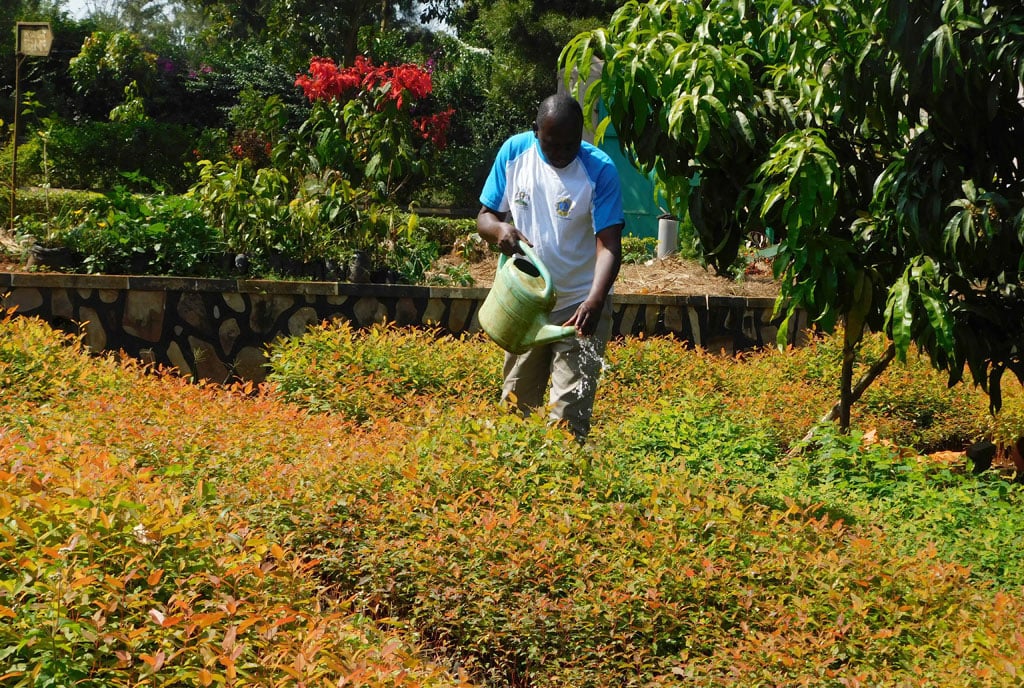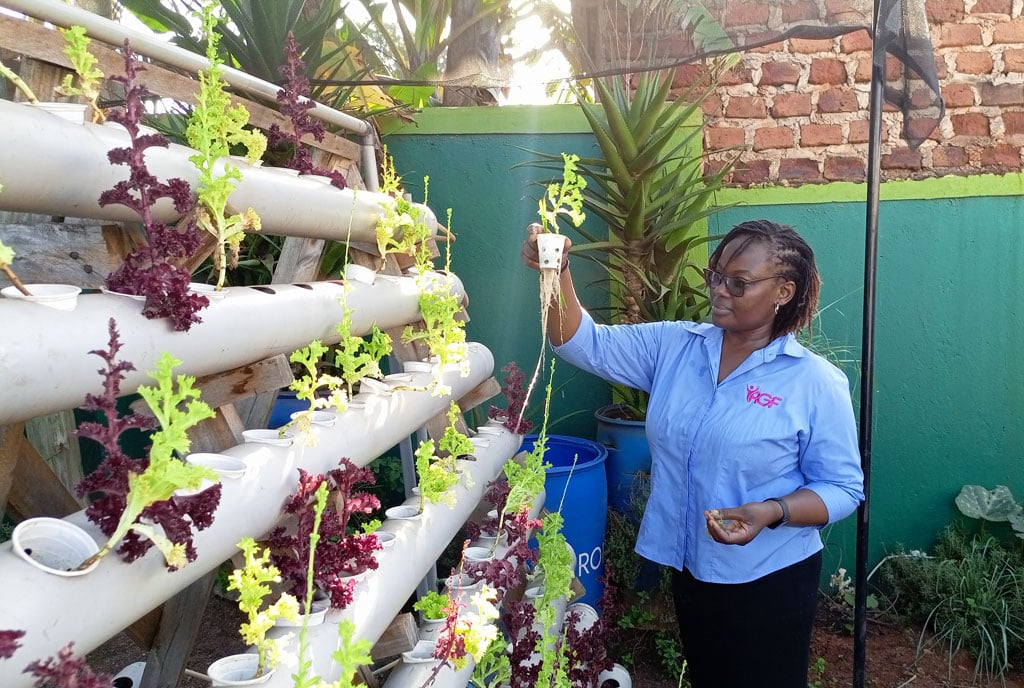
Eden Kamugisha, a tree farmer waters eucalyptus seedlings. PHOTO/MICHAEL J SSALI
One of the leading farmers in Masaka District, Eden Kamugisha, has written a book about his life and how he became a farmer after leaving his job as a senior prisons officer.
His book, titled: Unconventional and published last year, is a must read for all farmers and all young people intending to become farmers even when they don’t own large areas of land. Kamugisha who today has over 30,000 layers on his farm, a nursery bed for “South Africa” eucalyptus trees, and a nursery for fruit trees and cloned Robusta coffee, started off as a farmer on a plot of 2.8 acres.
“Actually, even before I purchased that much land, I had been keeping 400 layers in Kimaanya Division in Masaka City on a plot of land measuring 100 by 50 ft,” he told Seeds of Gold.
How Kamugisha made it
When he settled on his present farm at Kisagazi in Mukungwe Sub-county, Masaka City, which back then as earlier mentioned, was still just 2.8 acres, he began small, with some 2,000 layers. He has since then bought more and more land on which he has some 10 acres of eucalyptus trees, and more acres devoted to coffee growing and other activities, such as beekeeping and fish farming.
He is in the process of building a hotel and a camping site in the eucalyptus forest. His story is that of a successful large-scale farmer who began on a small piece of land. It is an inspiration to those desirous of becoming successful farmers but don’t have the required amount of land.
“In fact just one acre is big enough for any young person to carry out successful farming,” he says. “I even always wonder why so many people buy plots measuring 100 by 50 feet in urban areas; build a large residential house on it, and a perimeter wall around it without leaving any space for growing their own food. In my opinion some people would be better off selling those plots of land and using the money to purchase bigger spaces in rural areas where they can practice meaningful agriculture.”
Right decisions
He says the farmer with limited land must take the right decisions when choosing an economic activity. Poultry keeping is one of the farming activities that don’t require large expanses of land. He recommends building storied structures because, as he says, the sky is free space for any farmer intending to enlarge his farm.
He remembers a friend in Kampala who has devoted a single room measuring 25 by 20ft to keeping 300 broilers from which he earns Shs1.4 million per month.
“Yet he could have earned only about Shs200,000 every month from the same room if he had rented it to a tenant.” This clearly explains that a farmer can carry out gainful farming in the space of 25 by 20 ft.
Beekeeping
Kamugisha is also a beekeeper who aims at owning 800 beehives. He says beekeeping can be taken up by people who cannot afford to buy land.
“They can begin with borrowing some space and putting a few beehives there or they can enter into an arrangement with Nema and place some beehives in reserved forest land,” he says.
He disclosed that he is into beekeeping with a view to make more money than what he is earning from poultry.
“My real aim is not just to produce honey, bee wax, or royal jelly, but rather to produce bee venom which is by far more paying,” he says. “With some 800 beehives I expect to earn several times more than what I currently get from poultry keeping. My main disappointment is that there are not enough bees to fill up all the 800 beehives that I have bought.”
Today he has just about 300 active beehives out of the 800 that he purchased, which he attributes to the declining bee population, occasioned, according to him, by mindless usage of pesticides and herbicides by crop farmers and the wanton destruction of forests. He also attributes the bees’ decline to pests, vectors, and predators. He mentions rats, snakes, birds, lizards and some insects as the main culprits. But he is still hopeful that all the beehives will attract bees.
Vegetable farming
For farmers who live near urban centres, vegetable farming can be a good source of money.
It is possible to produce valuable amounts of vegetables on a small piece of land.
Some farmers enter into arrangements with busy restaurants in the neighbouring towns to supply them with vegetables on a daily basis.

A vegetable farmer attends to her crop. PHOTO/MICHAEL J SSALI
People who work on small farms have greater capacity to take meticulous care of their crops and a bigger chance of producing clean crops. Small gardens are easier to sustain since they can be monitored regularly.
The farmer can carry out irrigation using simple containers such as watering cans or mineral water bottles. He might also find it a lot easier to purchase sufficient organic manure like cow dung to cover the entire garden.
Constance Ithungu, crops technician in charge of Urban Farming and Vegetable Production at Mukono Zonal Agricultural Research Development Institute (MuZardi) Kamenyamiggo Satellite, says that most town dwellers don’t have to worry about buying vegetables all the time especially if they are in the low-income category.
“It is possible for town dwellers to grow their own vegetables and save the money that they would be spending to buy them,” she has told Seeds of Gold. “Even those who live in single rooms in towns can grow their own vegetables on soil packed in bags and placed right on their verandahs. They may even open up small gardens in the backyard. That is mainly the training that we give most attention to ---- helping urban communities to improve their diet and also to generate income by growing vegetables.”
Big returns
She also believes that vegetable farming is a quick way to get money especially for the youth that are struggling to become self-employed.
“On a fairly small piece of land,” she says, “one may plant perhaps 1,500 plants of sukumawiki which can be harvested every week and become a regular source of income for some six months.”
Advice
Small gardens are easier to sustain since they can be monitored regularly.

Ritah Nakitto of Banadda Smart Farm displays tomatoes growing in a sack of soil at CBS Powesa Agribusiness Fair. PHOTO/MICHAEL J SSALI
The farmer can carry out irrigation using simple containers such as watering cans or mineral water bottles. He might also find it a lot easier to purchase sufficient organic manure like cow dung to cover the entire garden.




